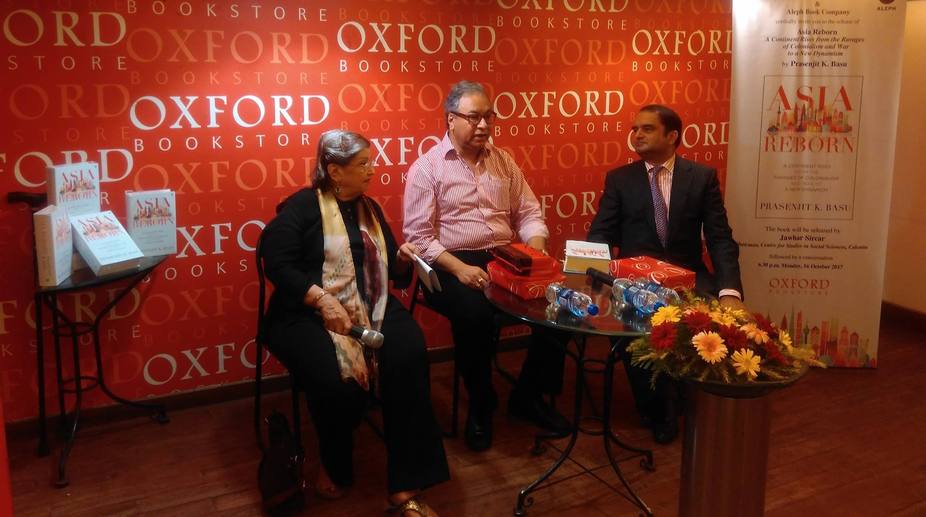City sizzles as Met dept extends heatwave alert
After sizzling at the highest day temperatures today, citizens of south Bengal, including Kolkata could face harsher days with the probability of temperature going up in the next few days.

(Photo: Facebook)
Prasenjit K Basu guided the audience through the lanes and bylanes of history as he discussed his new book, Asia Reborn: A Continent Rises From The Ravages of Colonialism And War To A New Dynamism, which was launched recently at Oxford Bookstore, Kolkata. He shared an insightful perspective regarding the history of Indian independence and the events that lead to it.
The first theme addresses why the parts of Asia ruled by the British are the poorest. On the other hand, the parts ruled by Japan like Taiwan, Korea and South Manchuria were the most prosperous in 1950 and continue to be the same today. It is worth explicating a few things that were dramatically different. When the British left, the literacy rate in India was 14 per cent. When they were ousted from Iraq in 1958 the literacy rate there was also14 per cent. On the other hand, India’s life expectancy at 1947 was 32 years while in the Japanese-ruled Taiwan was 64 years in 1945. The average life expectancy in Africa in 1950 was 38 years while in China it was 41 years. “To my mind there is no question that British rule over India was an absolute catastrophe,” Basu said.
The Japanese did land and currency reforms everywhere.With their advent, Taiwan and Korea became the most prosperous and fastest growing regions in the early 20th century. They underwent a green revolution for over 50 years. Besides, there was also infrastructure and industrial development.
Advertisement
There were four major steel companies in Korea built by the Japanese. Manchuria was massive and the only industrialised part of China. Her population rose to a swooping 45 million after 1945 from five million in 1915. But that wasn’t the case in the British ruled colonies. Scotland and Wales, which were also colonies of Britain received much better treatment than India or her other Asian colonies, being in close proximity to the colonisers.
According to Basu, the Japaneseruled colonies are much more egalitarian. China, though a Communist nation, is much more unequal than Japan, Korea or Taiwan. The Japanese also incubated nationalism in all the countries they ruled over.
The second theme acknowledges the role of the British Indian Army in holding together the edifice of European empires across Asia throughout the 19th and 20th centuries. “It is one of the great tragedies of modern India that the strategic role of the British Indian Army has been forgotten,” he said. It was because of them that after World War II, the British could re-establish Dutch rule over Indonesia and French control over Indo-China. After World War I, whether it was Gallipoli or the so-called liberation of Khalifa, Jerusalem and Damascus; or the China opium war in the late 1830s, it was the British Indian Army that held not only the British Empire but all European empires together. Basu said that India did not get Independence through non violence but by military means, due to the Indian National Army trials and the Royal Indian Navy mutiny. The INA had unleashed real nationalism across India and especially in North-east.
“I had spoken to many of the women from Rani Jhansi’s regiment including the deputy chief who died just recently. They still remain passionate in their commitment to India. They told me how they arrived in the jungles of Manipur with guns in hands and how she kissed the Indian soil for the first time as an 18-year-old. These are stories that need to be told and I hope that this book is the beginning of their retelling,” he said.
Basu said that Pakistan exists as a separate country today just to enable the British to control the oil of Iran, Iraq, UAE and Kuwait. It empowered them to have a strategic foothold in Baluchistan and control Iran, Iraq and the Persian dominion. Saudi Arabia too was created through British intelligence cooperation.
Jawaharlal Nehru appointed a Communist fellow traveller called Krishna Menon as defence minister, which according to Basu wasn’t a wise decision. Maulana Azad said that besides him, Gandhi and Patel too felt that Menon was not to be trusted with him being a Communist and not belonging to the Congress. But Nehru appointed him as the first high commissioner to Britain at the recommendation of Lord Mountbatten and Harold Macmillan.
The Muslim League was created in 1906 at the behest of Lord Minto. He created it with one single agenda-separate electorates. Maulana Azad in his book, India Wins Freedom, had clearly blamed Nehru for sabotaging possibilities of reconciliation between Congress and the Muslim League.
“So when I dedicate the book I have many great heroes mentioned and Nehru is not among them. Subhas Chandra Bose certainly is one of my heroes, even Gandhi deserves to be one as despite his shortcomings he played a key role in mobilising the Indian masses without which neither Bose nor anybody else had much of a role,” said Basu.
Advertisement